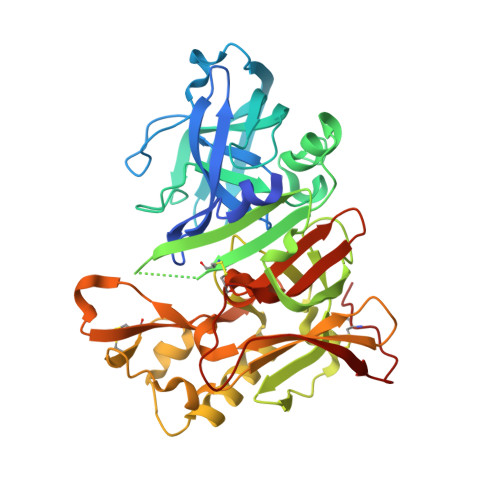The BACE-1 inhibitor CNP520 for prevention trials in Alzheimer's disease.
Neumann, U., Ufer, M., Jacobson, L.H., Rouzade-Dominguez, M.L., Huledal, G., Kolly, C., Luond, R.M., Machauer, R., Veenstra, S.J., Hurth, K., Rueeger, H., Tintelnot-Blomley, M., Staufenbiel, M., Shimshek, D.R., Perrot, L., Frieauff, W., Dubost, V., Schiller, H., Vogg, B., Beltz, K., Avrameas, A., Kretz, S., Pezous, N., Rondeau, J.M., Beckmann, N., Hartmann, A., Vormfelde, S., David, O.J., Galli, B., Ramos, R., Graf, A., Lopez Lopez, C.(2018) EMBO Mol Med 10
- PubMed: 30224383
- DOI: https://doi.org/10.15252/emmm.201809316
- Primary Citation of Related Structures:
6EQM - PubMed Abstract:
The beta-site amyloid precursor protein cleaving enzyme-1 (BACE-1) initiates the generation of amyloid-β (Aβ), and the amyloid cascade leading to amyloid plaque deposition, neurodegeneration, and dementia in Alzheimer's disease (AD). Clinical failures of anti-Aβ therapies in dementia stages suggest that treatment has to start in the early, asymptomatic disease states. The BACE-1 inhibitor CNP520 has a selectivity, pharmacodynamics, and distribution profile suitable for AD prevention studies. CNP520 reduced brain and cerebrospinal fluid (CSF) Aβ in rats and dogs, and Aβ plaque deposition in APP-transgenic mice. Animal toxicology studies of CNP520 demonstrated sufficient safety margins, with no signs of hair depigmentation, retina degeneration, liver toxicity, or cardiovascular effects. In healthy adults ≥ 60 years old, treatment with CNP520 was safe and well tolerated and resulted in robust and dose-dependent Aβ reduction in the cerebrospinal fluid. Thus, long-term, pivotal studies with CNP520 have been initiated in the Generation Program.
- Neuroscience, Novartis Institute for BioMedical Research, Basel, Switzerland ulf.neumann@novartis.com cristina.lopez_lopez@novartis.com.
Organizational Affiliation:

















